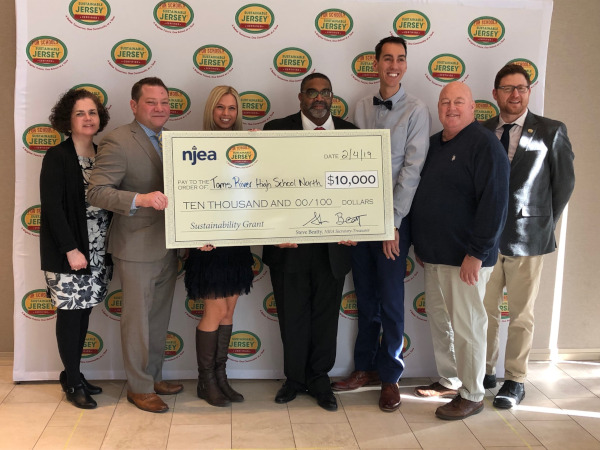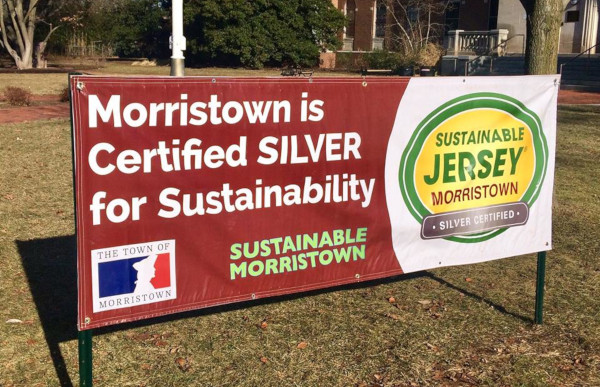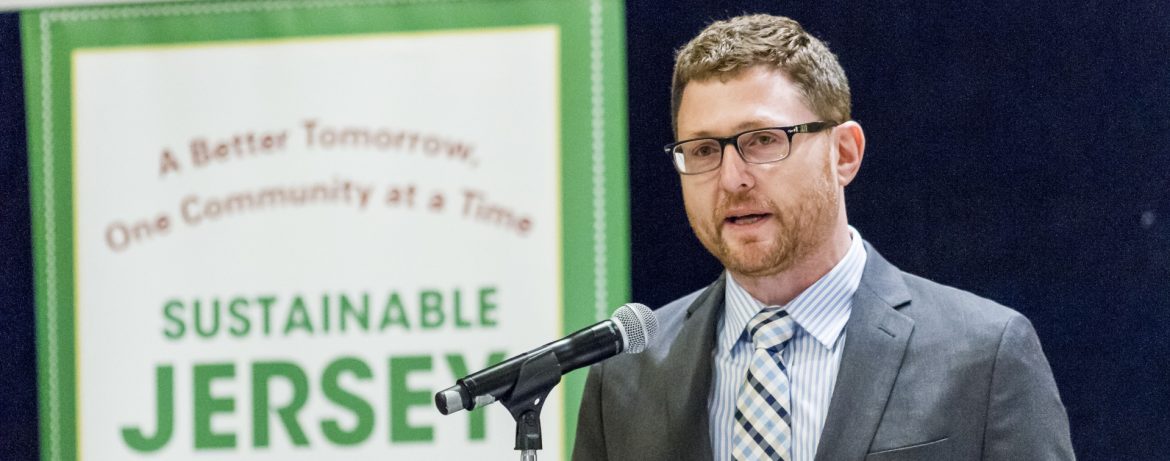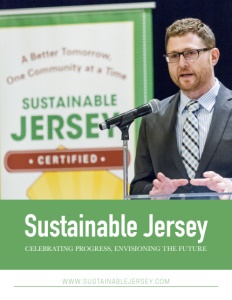Sustainable Jersey
Celebrating progress, envisioning the future
Business View Magazine interviews Randall Solomon, Executive Director of Sustainable Jersey as part of our focus on the non-profit environmental sector.
Sustainable Jersey is a nonprofit organization providing tools, training, and financial incentives to support New Jersey communities as they pursue sustainability programs. By supporting community efforts to reduce waste, cut greenhouse gas emissions, and improve environmental equity, Sustainable Jersey is empowering communities to build a better world for future generations.
Since 2009, Sustainable Jersey has registered over 440 municipalities in its program and actively certified over 200 communities from around the State. Participating municipalities have completed over 6,000 actions and are putting comprehensive sustainability programs in place in their communities.
Sustainable Jersey certification is a prestigious designation for municipal governments in New Jersey. Municipalities achieving certification are considered by their peers, by state government, and by the experts and civic organizations in New Jersey, to be among the leading municipalities. The certification is free and completely voluntary.
In addition to the certification program, Sustainable Jersey has worked with sponsors to award over 350 grants to New Jersey municipalities for sustainability projects that make communities more livable, environmentally friendly, and prosperous. Sustainable Jersey completes approximately 80 trainings and events each year to educate participants. Funding comes as follows: 1/3 from state government, 1/3 from corporate contributors, and 1/3 from philanthropic foundations.

Staff is roughly 20 people: About one third manage operations like the certification program, such as working directly with the municipalities, doing technical assistance. About a third are doing outreach, including running about a hundred different events from workshops and webinars, stakeholder meetings, and trainings. A final third are doing research and program development on the next generation of best practices and strategies.
Randall Solomon, Sustainable Jersey’s Executive Director, talks about the origins of the organization: “The founders were concerned about the future and realized we have to start making serious progress on a number of sustainability issues, not the least of which is climate,” he recounts. “There was a level of frustration in high levels of government and a sense that we have to just start working on this now and in New Jersey. We can’t wait for somebody else to solve the problem. We have to just start implementing solutions at all levels. Sustainable Jersey is a novel, unique, and interesting approach to how to make progress in a broad scale, something that wasn’t really done anywhere else before. And it’s making real, substantive, measurable progress on the ground. We’re now part of a network of programs similar to ours that we founded, in twelve other states, so there are versions of Sustainable Jersey in Connecticut, New York, Pennsylvania, Maryland, Minnesota, Massachusetts, etc.”
New Jersey is a home-rule state, meaning local governments have great authority at the local level over drinking water, elements of the energy system, land use, transportation, schools and education, and local economic development. “Having tremendous authority doesn’t mean having a lot of capacity to make decisions and implement them,” Solomon explains. “Most small cities don’t have suites of high-level government workers with PhDs to figure out solutions to these issues. And it didn’t make a lot of sense to have 565 individual units of local government and individual municipalities each figuring out what they’re going to do regarding water, transportation, energy, and all these connected issues touching on sustainability.”
Thus, Sustainable Jersey was born as a way to partner with and engage the ‘Coalition of the Willing’ that wanted to move forward and make progress on these concerns. That included a number of leading mayors in the state, along with the state’s League of Municipalities, and some of the key state agencies, as well as a number of leaders in the business community. Solomon notes, “We came together and formed Sustainable Jersey with the mission to achieve a better tomorrow, one community at a time, working from the bottom up, to solve our key sustainability issues by having a broad impact at the local level.”
Of New Jersey’s 565 municipalities, 450 are now registered with the program to try to achieve sustainability, which means each has passed a local ordinance or resolution stating their intention to become certified, appointed a formal liaison to be in charge, and created a local government body to coordinate their activities in relation to the program. “Being a certification program, we’ve got very specific action steps we want these municipalities to implement,” says Solomon, “the ordinances, policies, plans, initiatives, and infrastructure we want them to implement that we think is best going to achieve what needs to be achieved on a host of different issues. If they implement those things, they can score enough points to get certified.”
This past year, Sustainable Jersey got over 5,000 submissions from local governments implementing their actions and submitting documents to try to score points in the program. “Each one of those actions was a meaningful step they took that we have to review against an objective set of standards,” Solomon explains. “And often times they don’t meet the requirements in the first go-round, so that leads to an extended period of mentoring back and forth where we guide them on how to implement it; now multiply that by 5,000.”
There are currently 204 certified municipalities in two levels, bronze and silver (about 50 are silver). The bronze and the silver are for municipalities as a whole, like a bronze city or a silver town. Once they achieve silver, then they can go for a performance-based gold star for a particular issue, so towns could be gold-star-certified in energy, or gold-star-certified in water, indicating that a community has taken steps that puts them on a trajectory to actually achieve the goal. “In the case of energy, it’s to reduce greenhouse gas emissions by 80 percent by 2050, which is in line with the Kyoto Protocol and what the climate scientists are saying. We’re actually measuring progress, making sure that what municipalities are now doing on the ground is commensurate to achieving those lofty goals,” Solomon reports.

“There’s definitely virtuous competition going on over sustainability and it’s a matter of local pride to shine there,” he continues. “We make sure that there are meaningful political rewards for the local officials that do this work, so we celebrate them in front of their peers and generate a lot of press for the work they do. There are also financial rewards such as priority access to grant programs from public and private sources and our partners. Of course, many of the actions, themselves, save money or make money. For example, if you follow through on our sustainable energy slate of actions, you’ll save money on energy efficiency and make money on generating renewables.”
Solomon adds that such programs actually solve other problems they’re already facing, for example, by improving local air quality, lowering energy bills, and lowering the tax bills. “We’re providing best practices and solutions on a broad front of issues, and that’s helpful to them,” he avers. “It’s also helpful politically, because their constituents are demanding action on these issues, but they might not have had a good way to achieve it, previously. We give them a trusted and vetted pathway forward, a very detailed and prescriptive road map of what to do on very on specific issues. It’s kind of a safe zone for them because it’s been tested and they know it’s going to work.”
Why haven’t all municipalities taken advantage of this free and beneficial program? Solomon suggests smaller municipalities do not have as much bandwidth as larger municipalities. “I think the biggest factor is size,” he muses. “Often lacking full-time staff, they all take turns being mayor, as it were. For some it might be political. Some might just be disorganized. Government leadership absolutely matters at the local level. Groups like ours, who work at the local level, can’t do it alone. There has to be a federal partner. There has to be a strong state government for it to work. But with the leading communities in the state proving what can be done at the local level, you now have significant models that can be spread to the rest of the municipalities.”
The Sustainable Jersey for Schools program launched in 2014, rolling out a certification program for schools and school districts across the state, kindergarten through 12th grade. There are 590 school districts in New Jersey, with 310 of them participating, with a similar structure to the municipal program. Though both focus on buildings and facilities, saving energy, recycling, and purchasing recycled and non-toxic materials, the municipal program involves passing laws and doing planning that impacts the rest of the community, including all the residents and businesses in the community. “School’s don’t do that, but schools teach kids, so there’s a lot in the school program that deals with curriculum,” Solomon says. “Teaching the next generation is really inspiring. It’s amazing to see, once you get students engaged, what they can do. And it’s really humbling, also, to see how much they actually know about what’s going on and how hard they’re pushing, because they realize it’s their future at stake.”
Solomon attributes much of their success to a transparent collaborative process used to determine what those actions and standards will be and where the resources will come from to support the municipalities. There are 20 different issue-oriented task forces, including energy, waste, land use, transportation, and water. They convene academics and experts from the private sector, state agencies, non-profit community groups, the municipalities, and schools.
“Working together we identify what the key issues are and what the solutions are,” Solomon states. “We do research to identify those solutions, to codify them into specific standards, and then, if the processing certification standards committee ultimately approves all this, it gets into the program. Because it has all those key stakeholders agreeing, together, about what it is that we could and should do at the local level, that’s where we get the resources for grants and technical assistance and all the other hand holding. In a lot of ways it starts to look almost like a government, but it’s an informal government, without the red tape, focused on sustainability.”
AT A GLANCE
WHO: Sustainable Jersey
WHAT: A nonprofit organization supporting New Jersey communities
WHERE: Ewing, New Jersey
WEBSITE: www.sustainablejersey.com


